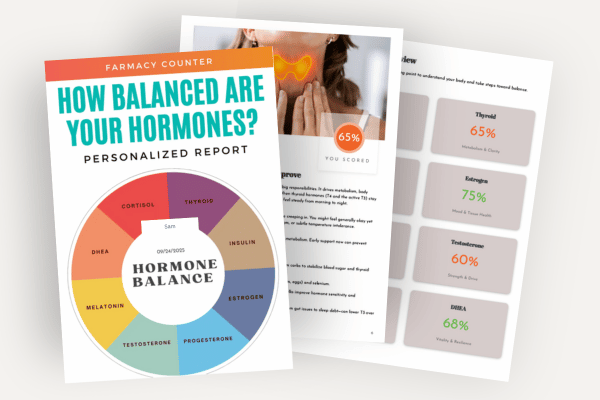
Have you ever felt like your body is running on a schedule you didn’t sign up for?
You’re wide awake at midnight but can’t focus by mid-morning. Your clothes fit differently even though your habits haven’t changed. Your mood swings seem to appear out of nowhere, and no matter how early you get to bed, deep sleep feels out of reach.
This isn’t random — and it’s not “just in your head.” Your hormones could be quietly calling the shots.
The Hidden Role of Hormones
Hormones are your body’s chemical messengers — tiny molecules that communicate between your brain, glands, and cells to help maintain balance. They influence nearly everything: your energy, mood, metabolism, sleep, and even how you handle stress.
When they’re in sync, life feels smoother. You think clearly, your mood feels stable, and your energy matches your day. But when they’re out of balance, even simple tasks can start to feel overwhelming.
In functional medicine, we look beyond individual hormones. We explore how stress, blood sugar regulation, gut health, nutrient status, and environmental exposures all interact to shape hormonal balance.

Cortisol: The Stress Hormone That Doesn’t Clock Out
Cortisol is designed to help you wake up, focus, and handle daily stress. It’s supposed to peak in the morning and gently decline as the day winds down.
But when stress becomes constant — whether it’s emotional, physical, or environmental — cortisol can stay elevated for too long. You might feel both exhausted and restless, like your body can’t switch off. Over time, this dysregulation affects sleep, immune health, and even blood sugar stability.
Estrogen and Progesterone: More Than Reproductive Hormones
Estrogen and progesterone don’t just influence your menstrual cycle — they’re deeply connected to your brain chemistry.
Estrogen supports serotonin (the “feel-good” neurotransmitter), while progesterone boosts GABA, which helps you feel calm and grounded. When these hormones fluctuate — whether during PMS, perimenopause, or chronic stress — you may notice mood swings, anxiety, poor sleep, or brain fog.
Functional medicine helps identify why these shifts are happening: perhaps your liver isn’t efficiently clearing excess estrogen, your gut microbiome is out of balance, or chronic stress is suppressing ovulation.
Thyroid Hormones: Your Metabolic Thermostat
Your thyroid acts like your body’s internal engine. It regulates how quickly your cells convert food into energy.
When thyroid hormones are too low, your metabolism slows — you may feel tired, chilled, mentally sluggish, or find that weight creeps up despite no major lifestyle changes.
Functional practitioners often look beyond basic thyroid labs, investigating nutrient cofactors (like iodine, selenium, and zinc), autoimmune triggers, and how adrenal or gut health might be impacting thyroid function.

Listening to What Your Body Is Saying
If you’ve been feeling “off” — tired for no clear reason, emotionally unpredictable, gaining weight, or sleeping poorly — your body may be asking for deeper attention.
In functional medicine, we see these symptoms as signals, not isolated problems. Your body is designed to communicate — the key is learning to listen.
The encouraging truth? Hormones are adaptable. When you support the systems that influence them — nourishing meals that balance blood sugar, quality sleep, mindful movement, and stress recovery — your body begins to recalibrate.
Where to Start
You don’t need to fix everything overnight. Begin by observing your patterns — energy dips, sleep quality, mood changes, cravings. Small, consistent adjustments often make the biggest difference.
If you suspect your hormones are out of balance, working with a functional medicine practitioner can help uncover what’s driving the imbalance — not just mask the symptoms.
Your body is always communicating. The question is: are you listening?
Ready to See Where Your Hormones Stand?
If you’re wondering how your own hormone rhythms are functioning — and whether stress, sleep loss, or lifestyle shifts might be throwing things off — here’s an easy next step.
👉 Take the “How Balanced Are Your Hormones?” Quiz here»
You’ll receive a free, personalized 13-page hormone report that explores eight key hormone systems through a functional medicine lens, including:
✅ A snapshot of your current hormone balance
✅ Insights into your energy, mood, sleep, metabolism, and reproductive health
✅ Functional medicine–based guidance to help you begin rebalancing naturally
Think of it as your roadmap back to alignment — helping you understand your body’s signals, restore hormonal harmony, and feel more clear, steady, and strong from the inside out.

How Balanced are Your Hormones?
Take our 3-minute quiz to discover your unique hormone balance—and get a personalized 13-page report with insights and actionable steps to support energy, mood, sleep, metabolism, and reproductive health.






